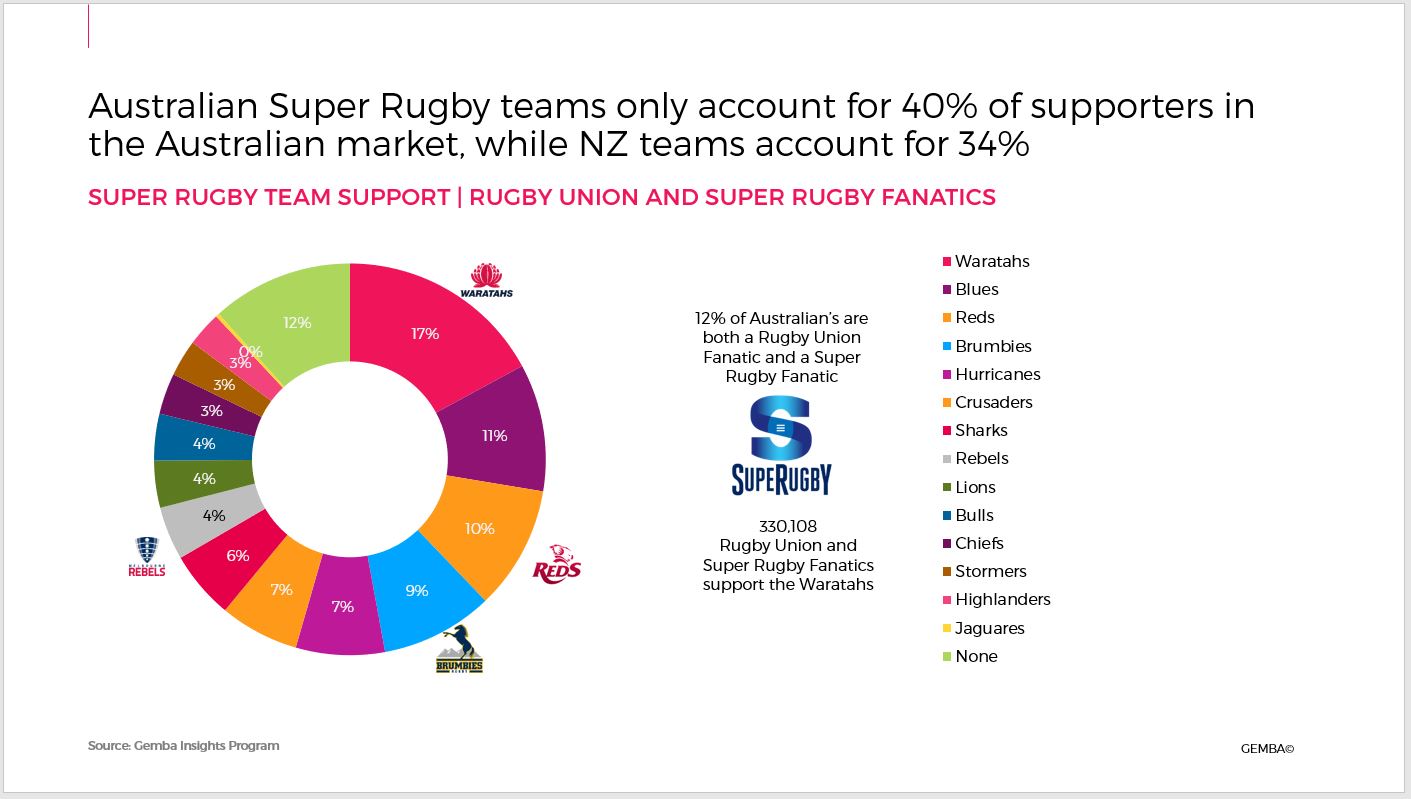I've been a lurker on this forum for a while, but recent events have made me want to throw my hat in the ring.
This article expresses a lot of the concerns I have with the Super Rugby model. Put simply, it doesn't produce much engaging content for Australian rugby union fans. There are a few reasons for this. (1) We only have four teams, so there can't be more than 4 matches featuring Australian teams. When you throw in local derbies, which (while often better quality) soak up two Australian teams, and byes you often end up with weekends with 1 or 2 matches featuring Australian teams. (2) Often these matches are in inconvenient time zones, or against meaningless teams. (3) The obvious and persistent FTA access problem. (4) Broader issues with the state of Rugby / the competition, particularly: rules / referees perceived to be annoying, styles of play perceived to be boring, absurd amounts of travel (and therefore higher costs for broadcasters and teams), and massive wealth disparities stripping the South of its best talent and depth (and therefore undermining quality of play).
I genuinely can't understand how anyone thought this model could create a product that could engage or monetise the Australian public, especially when each weekend rivals like the NRL and AFL give Australian fans 8 games featuring Australian teams. I am always deeply envious of my friends who are into NRL or AFL—at almost any point after 12pm on a weekend during a (non-COVID-affected) winter they can turn on the TV and find a game that's relevant and interesting. They often have games on Thursday and Monday nights too, so they don't go as long between drinks.
To be fair, the increasing investment in Women's Rugby and Sevens has created a bit more content, but the AFL and NRL have made corresponding, if not bigger, investments in their Women's and shorter formats, so the same ratio of disparity remains. We also have a lot of NZ, British, South African, and European migrants in Australia, so there are communities interested in International fixtures, no doubt. And no one's doubting that there's plenty of entertaining Rugby from around the world worth watching and admiring. But the proof is ultimately in the pudding: ratings, performance, media coverage, and general mainstream interest has never been lower. No one cares and has no reason to, not when there are competitions that attract big audiences (in-person or on TV) to anywhere between 2x and 4x the amount of Australian fixtures a week.
What makes matters worse is that most of the other entertaining or interesting Rugby take place on a Saturday between 3 and 5.30pm. If you added up all the people who attend a Schools or Club (especially Premier Grade) game in Sydney or Brisbane in that time period, it'd be more than enough to fill the SFS or Lang Park, and even individual fixtures get crowds in excess of ten thousand. And the thing is, there are actually a lot of people who find themselves torn between attending school or local club fixtures, or even choosing between certain club fixtures. If they could, they'd go to both.
I am totally supportive of a national club competition with relegation. I think a regional / provincial but shortened Super Rugby competition could follow it, perhaps with pools and a finals format, a la the European Champions Cup (in fact, I have no problem with expanding this into the World Club competition some are discussing and which I think would be better than a World Nations competition). The reality is, both competitions are a long way off the horizon at the moment, not only because of COVID-19, but also because of vested interest. SANZAAR, along with all the other nodes in the power network with noses in troughs (News Corp., Old Boys, media personalities, ex-players, current players, state / club faceless power brokers), continue to operate with the same short-termism that has defined the game here since it first went professional. A national club competition would be far less profitable and lead to smaller wages for people with a lot of bargaining leverage, in the short-term, even if it was coupled with a regional / provincial follow-up (which is unlikely). But the reality is, Super Rugby is also not profitable, and was already going to be less valuable to RA before COVID-19. And the fact is, it's never going to be profitable again, it has absolutely hit its ceiling of relevance, profitability, engagement, etc. The only option is to take a short-term hit, and concentrate the funds and attention we do have into getting a domestic competition off the ground that generates more content (by staggering game times) and has at least some FTA presence.
As a final point, this is exactly what should have been done at the start of the professional era. Instead of taking the time to lay the ground work (e.g. by having smaller broadcast revenues but running on FTA, professionalising / supporting clubs, investing in school programs to be taught in public / non-traditional rugby schools during PE, connecting grassroots clubs to professionals, creating elite talent identification and juniors pathways, etc.) administrators and players rushed into the deal that could net them the most money then, superimposing a shoddy professional structure onto deeply partisan and non-meritocratic amateur bodies. They made Super Rugby and News Corp. one and the same, and initially got away with it because the quality of play was sensational (as it was always going to be as soon as players started to get paid) and the Wallabies were kicking ass. But it was, of course, a classic case of correlation, not causation, and once the exogenous variables were removed the rot immediately start to set in. Let's hope people can be guided by common sense, reason, and, as this latest SMH article shows, empirical fact.

